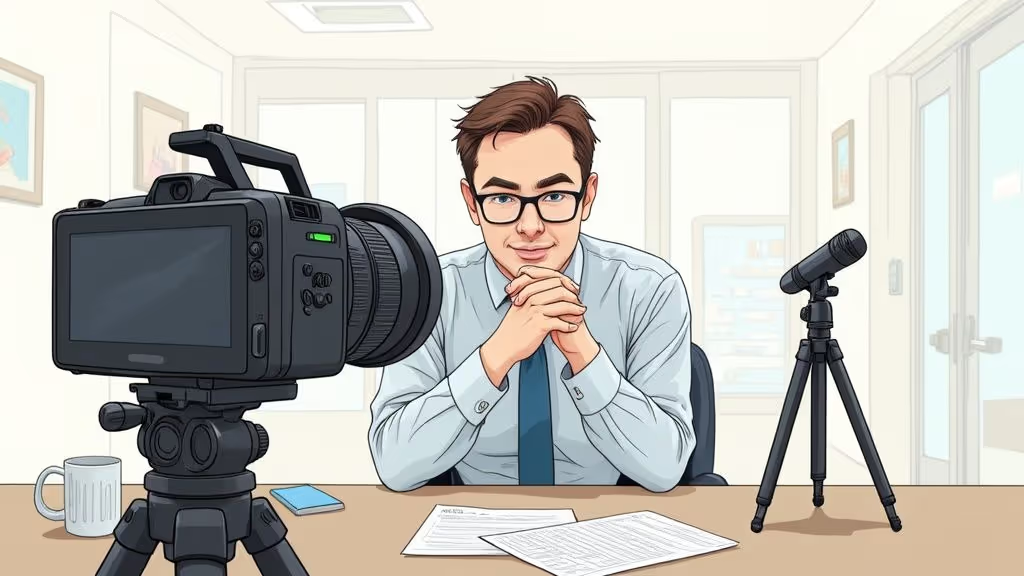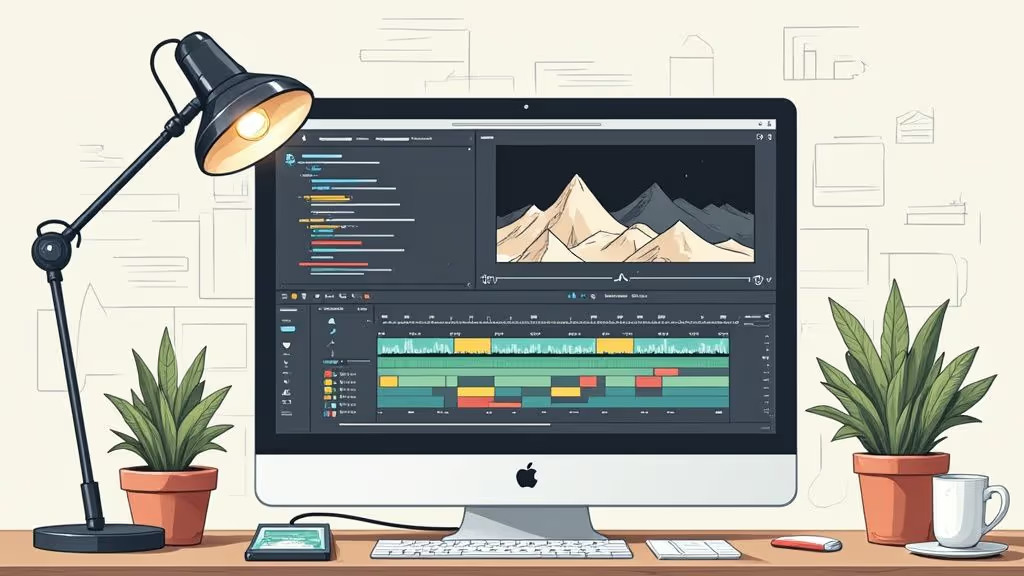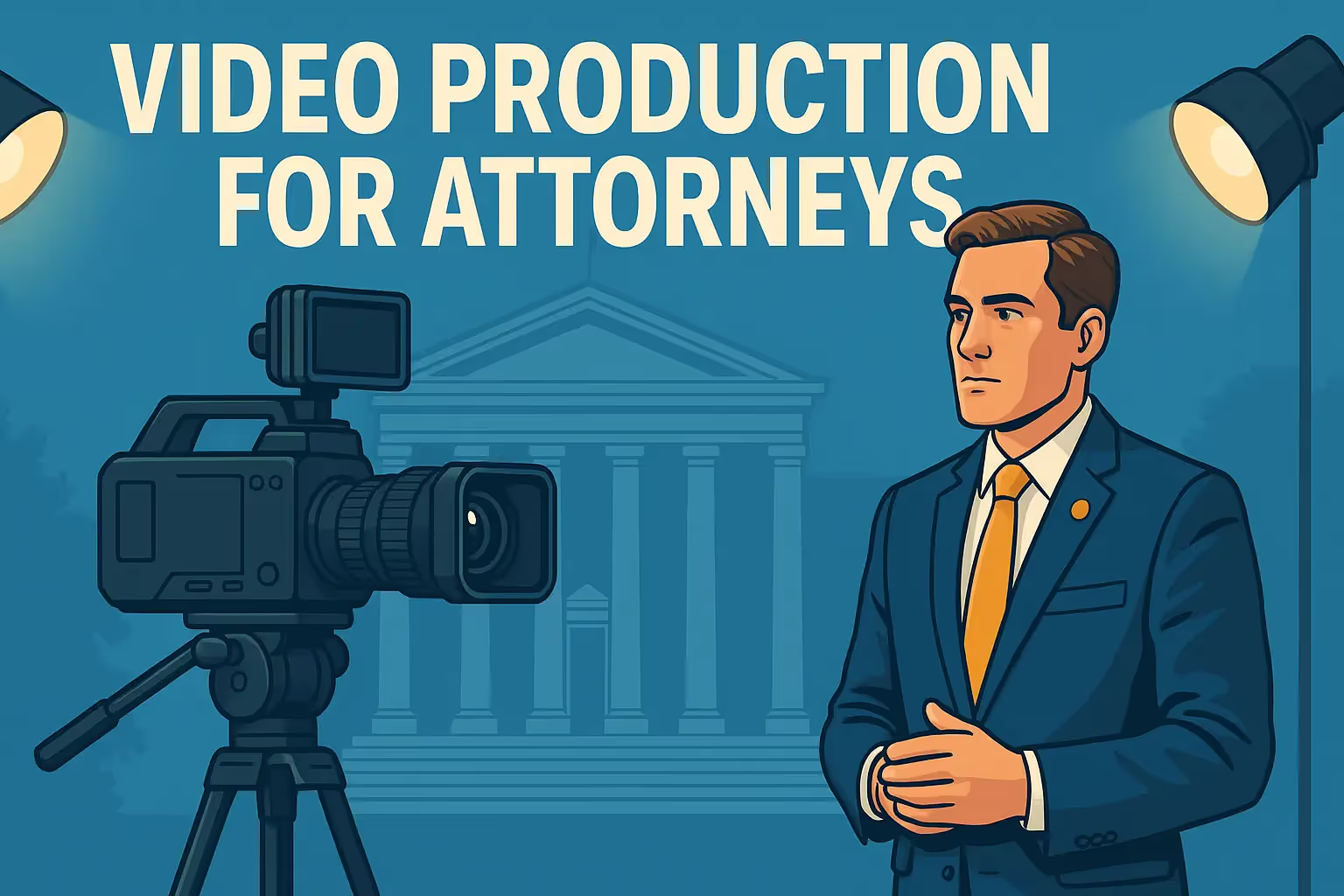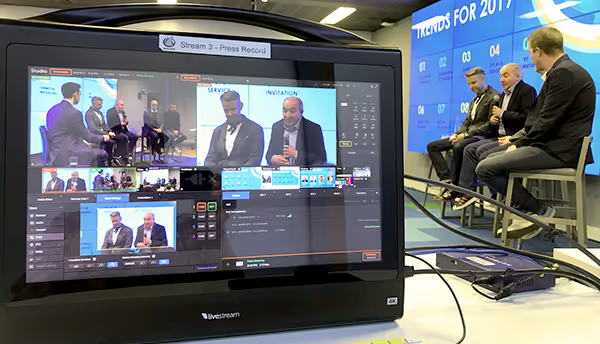Table of Contents
Why Video Production for Attorneys Is No Longer Optional
Attorneys need to connect with potential clients. More and more, these clients search online for legal information and guidance. They research lawyers, form opinions, and make decisions before ever contacting a firm. This makes a strong online presence essential. Video production, in particular, is key for attorneys to build trust, establish credibility, and encourage client consultations.
Building Trust and Rapport Through Video
Trust is paramount in the attorney-client relationship. However, building that trust online can be challenging with traditional text. Video offers a way to humanize your practice and connect with potential clients personally. Attorney bio videos, for example, allow prospects to see and hear you, conveying personality and building rapport before a consultation even begins. This personal touch fosters familiarity and confidence, significantly influencing a client's decision.
Client testimonial videos offer invaluable social proof. When potential clients see and hear real clients share positive experiences, it provides strong validation. These testimonials showcase your work’s impact in a way that text simply cannot. This is particularly critical in law, where trust and credibility are paramount.
Overcoming Obstacles with Video
Many attorneys express concerns about video production, from privacy issues and budget constraints to on-camera anxiety. These obstacles can be easily addressed. Privacy concerns can be handled through careful scripting and client permissions. Budget issues can be managed by prioritizing video types. While some videos, like client testimonials, might benefit from professional production, others, such as FAQ videos, can be created in-house with basic equipment.
The increasing demand for video content is driving its adoption.
Leveraging Video for Strategic Advantage
Platforms like LinkedIn and Facebook prioritize video content in their algorithms. This gives compliant firms a 30-50% higher organic reach than text posts. This greater visibility means more potential clients discovering your firm, leading to increased consultations. Video production can also significantly lower client acquisition costs. By reducing skepticism and building rapport before consultations, video marketing streamlines client intake and improves overall ROI. This shift towards video isn't a fleeting trend; it's a fundamental change in how clients find and choose legal representation. Attorneys who embrace video position themselves for success in the evolving legal market.
The 7 Video Types That Actually Drive Client Consultations
Not all legal videos are created equal. Some truly connect with potential clients, leading to more consultations and fostering trust, while others simply don't get the job done.
The data chart below visualizes the impact of various video types on key client acquisition metrics like lead generation and trust-building. Each video type plays a unique role in the client journey, offering different levels of engagement and effectiveness.

As the data chart illustrates, client testimonials and explainer videos excel at building trust, while social proof clips and FAQ videos are particularly strong for lead generation. Understanding these strengths can help you tailor your video strategy for optimal results.
1. Client Testimonials = Social Proof
Client testimonials are fundamental for building trust in legal marketing. They provide social proof, letting potential clients see and hear real people who have benefited from your services. For the greatest impact, prioritize professionally filmed testimonials with clear audio and minimal background noise. Emotional storytelling is key; let your clients’ experiences shine through.
2. Attorney Introduction/Bio Videos: Connecting on a Human Level
People hire people, not just law firms. Attorney introduction videos humanize your practice. These concise, direct-to-camera videos (60-90 seconds) allow potential clients to connect with you personally. Filming in your office setting adds a touch of authority while still letting your personality shine through.
3. Explainer Videos (Legal Concepts): Showcasing Your Expertise
Explainer videos provide immense value by clarifying complex legal procedures for potential clients. This content not only educates but also subtly highlights your expertise. Consider a talking-head format with animated graphics or B-roll footage to keep viewers engaged while simplifying intricate legal ideas. This helpful content also improves SEO, drawing in potential clients actively searching for information.
4. Case Study or "Day in the Life" Videos: Demonstrating Real-World Impact
Case studies or "day in the life" videos offer a glimpse into your work ethic and the real results you deliver. These short documentaries should include visuals of you working, interacting with clients, and achieving positive outcomes. This practical demonstration resonates strongly with potential clients looking for evidence of your abilities.
5. FAQ Videos: Addressing Common Concerns Proactively
FAQ videos efficiently tackle frequently asked questions, saving you time and pre-qualifying leads. Short videos (30-60 seconds) answering common queries build trust and demonstrate your responsiveness. These are perfect for embedding on your website and sharing on social media platforms like Facebook, YouTube, and LinkedIn. Internal data suggests that using FAQ videos can lead to a 20% reduction in pre-consultation inquiries, letting your team concentrate on qualified leads.
6. Event or Seminar Recordings: Establishing Thought Leadership
Recordings of events and seminars showcase your thought leadership, especially useful for B2B law firms or those targeting high-net-worth individuals. These recordings should be well-produced, with excellent audio and integrated slides. This content strengthens credibility and positions you as an industry authority.
7. Social Proof Clips for Ads: Driving Leads Through Targeted Advertising
Social proof clips, repurposed from longer testimonials or FAQs, are highly effective for targeted advertising on platforms like Facebook, YouTube, and LinkedIn. These short, engaging videos (optimized for mobile viewing with subtitles) should include a clear call to action. Studies show that law firms using video ads on social media see a 15% lift in lead generation compared to those using only text-based ads.
To help you choose the right video types for your law firm, let's take a closer look at the purpose and impact of each format. The following table summarizes key information about each video type, including their ideal length, production complexity, and relative impact on lead generation and trust-building.
This table offers a clear comparison of different video formats, highlighting their strengths and weaknesses across various metrics. Consider this information when planning your video marketing strategy to ensure you're using the right videos for your specific goals.
Creating Client Testimonial Videos That Build Instant Trust
Client testimonials are the foundation of trust and credibility for attorneys. They provide social proof, showing potential clients that others have had successful experiences with your firm. But simply having testimonials isn't enough. Producing high-quality videos that truly connect with viewers is essential for turning potential clients into actual clients. This requires thorough planning, effective interviewing, and professional video production.
Identifying Ideal Clients and Obtaining Permissions
The first step is choosing the right clients to showcase. Look for individuals who can articulate their experiences clearly and persuasively, especially those whose cases highlight your firm’s specific strengths. After identifying these candidates, obtaining their informed consent is critical. This means explaining the video's purpose, where it will be published, and getting written permission to use their story and likeness. Addressing these ethical and privacy considerations upfront ensures a smooth process.
Preparing for Powerful On-Camera Interviews
Helping clients feel comfortable on camera is crucial for capturing genuine and engaging testimonials. Before filming, schedule a pre-interview call to discuss their experience and the questions you’ll be asking. This allows them to gather their thoughts and feel more relaxed during the actual recording. Offer them a general outline of the interview, but avoid overly scripting their responses to preserve authenticity.
Stories Through Thoughtful Questioning
During the interview, ask open-ended questions that encourage clients to share their experiences naturally. Instead of asking, "Were you satisfied with our services?", try something like, "How did our services make a difference in your situation?". This encourages them to describe the specific ways your firm helped them, creating a stronger impact. Questions such as "What were your biggest concerns before hiring us?" and "How did our team address those concerns?" can provide valuable insights into the client journey and underscore the value your firm brings.
Mastering the Technical Essentials for Professional Videos
Professional-looking videos enhance the credibility of client testimonials. This requires attention to both high-quality audio and video. Use a good microphone to ensure clear audio and minimize background noise. Lighting is also essential. Make sure the subject is well-lit, avoiding harsh shadows. A simple three-point lighting setup can substantially improve the overall look of your video.
Ethical Considerations and Privacy Concerns for Legal Testimonials
Maintaining client confidentiality is paramount in the legal field. When producing testimonials, always be mindful of ethical guidelines and privacy regulations. Never disclose sensitive case information or identifying details without explicit client permission. Techniques like blurring faces or using pseudonyms can protect client privacy while still showcasing the positive impact of your services. Remember to adhere to any specific rules regarding testimonials in legal advertising within your jurisdiction.
Leveraging Short-Form Video for Maximum Impact
Short-form video has become a dominant force in online marketing, with concise, captivating content holding audience attention and boosting client engagement. In 2024, short-form video made up 90% of all internet traffic, demonstrating the effectiveness of brief, impactful storytelling.
Attorney Bio Videos: Showing Your Human Side While Maintaining Authority

Connecting with potential clients on a personal level is crucial. Attorney bio videos offer a powerful way to build that connection, showcasing your personality while reinforcing your legal expertise. These videos allow prospective clients to get to know you before even stepping into your office, fostering a sense of trust and rapport.
Preparation: On-Camera Nerves
Speaking in front of a camera can be daunting, even for experienced attorneys. The key to a natural and confident on-screen presence is preparation. Practicing your script, even a simple outline, helps avoid awkward pauses and ensures a smooth delivery. Consider rehearsing with a colleague or friend for valuable feedback and refinement. This preparation builds confidence, allowing your true personality to shine.
Scripting: Striking the Right Balance
Your bio video script should be a concise and engaging introduction. Aim for 60-90 seconds, providing enough information without losing viewer interest. Start by stating your name and practice area, followed by a brief overview of your professional background. Focus on how your experience benefits clients. For example, instead of saying "I graduated from Harvard Law," rephrase it as "My Harvard Law education enables me to develop effective legal strategies for my clients." This client-centric approach makes your credentials more relatable and impactful.
Visual Presentation: Projecting Confidence and Expertise
Visuals significantly influence client perception. Dress professionally yet approachable, choosing attire suitable for your practice area. Film the video in your office or a courtroom setting to reinforce your legal expertise. Maintain natural eye contact with the camera, as if speaking directly to a potential client. Use subtle body language to emphasize key points, avoiding overly dramatic gestures. These visual cues project confidence and expertise.
Distribution: Reaching Your Intended Audience
Once your video is complete, strategic distribution is key. Feature the video prominently on your website's "About Us" page. Share it on your social media platforms, such as LinkedIn, to connect with professionals. Including the video in email newsletters further extends its reach. This multi-platform approach ensures maximum visibility.
Formats and Examples: Adapting to Your Practice
Different legal fields call for different approaches. A family law attorney might use a warm and empathetic tone, while a corporate lawyer may opt for a more formal demeanor. Consider visuals relevant to your practice, such as images of families or business meetings. A personal injury lawyer might show footage of client interaction, while a real estate attorney could include visuals of successful closings. These personalized touches enhance the video's impact.
By thoughtfully crafting and distributing your attorney bio video, you create a compelling introduction that attracts new clients and strengthens your online presence. Investing in video production provides a significant return by building trust, showcasing expertise, and ultimately driving client consultations.
Turning Legal Expertise Into Compelling Video Content

Educational videos are a powerful tool for attorneys to build trust and establish authority with potential clients. This section explores creating explainer videos and FAQ videos to present legal expertise in a way that's easy to understand. These video types can be highly effective for lead generation and building trust, especially when combined with clear calls to action.
Identifying Key Client Questions
Creating effective legal videos starts with understanding what potential clients want to know. Analyze search data, review common questions from consultations, and map out the client journey for your practice area. For example, a family lawyer might create videos about child custody or divorce proceedings. A personal injury lawyer might focus on explaining how to file a claim. By addressing these key questions, your video content directly targets client needs.
Simplifying Complex Legal Concepts
Legal jargon can be confusing. Explainer videos offer a chance to break down complex legal concepts into easily digestible information. Think of it as translating legalese into plain English. Use real-world examples and analogies to clarify confusing legal processes. Visual aids, such as on-screen text or animations, can further enhance viewer understanding and engagement.
Expertise and Accessibility
Demonstrating your knowledge without overwhelming viewers is essential. Avoid complex legal terms, focusing instead on clear, concise explanations. Treat your videos like a conversation with a potential client, addressing their concerns directly and honestly. This approach builds trust and encourages viewers to see you as an approachable expert, prompting them to contact you for further assistance.
Practical Production Considerations
Creating a series of educational videos benefits from efficient and consistent production. Develop a template for your videos that includes consistent branding, intro/outro sequences, and on-screen graphics. This approach creates a professional and cohesive look for your video library. A consistent format streamlines the production process, making it easier to create and update videos, particularly important for FAQ videos which may require regular updates as legal procedures change.
Optimizing Video for SEO
Just like written content, video content needs SEO optimization to be easily found. Use relevant keywords in your video title, description, and tags. Closed captions and transcripts improve accessibility and search engine indexing, increasing visibility in search results and attracting potential clients.
Utilizing Visual Storytelling Techniques
Visuals are essential for making explainer and FAQ videos engaging and effective. An animated flowchart can clearly explain the stages of a legal process. B-roll footage of relevant legal settings creates a more immersive viewing experience. These techniques transform complex legal information into dynamic, easy-to-understand content.
To further illustrate the effectiveness of different video formats, consider the following table:
Legal Video Content Performance Metrics
This table summarizes key performance indicators for different video formats used by law firms. As you can see, client testimonials and case study videos often have higher completion rates and conversion potential. However, explainer videos have a strong SEO impact, making them valuable for attracting new clients.
Building Trust and Encouraging Consultations
By providing valuable information and simplifying complex topics, you position yourself as a trusted resource. This increased trust leads to more consultations, as viewers are more likely to contact an attorney they find knowledgeable and helpful. A clear call to action at the end of your videos encourages viewers to reach out for a consultation.
This client-focused approach to video production establishes you as a trusted authority and encourages potential clients to connect with you and your firm. Effective video production for attorneys isn't just about creating visually appealing content; it's about building relationships and achieving tangible results.
Video Production for Attorneys: DIY vs. Professional Services
Attorneys looking to harness the power of video marketing face a crucial decision: produce videos in-house, or partner with a professional agency? This section explores the advantages and disadvantages of both approaches, helping you make the best choice for your firm's specific resources, budget, and long-term content strategy.
DIY Video Production: Benefits and Limitations
Creating videos in-house can lead to substantial cost savings, particularly for content that requires frequent updates. Think short, informational videos for social media or a series of FAQs. This DIY method also offers greater control over the creative process and faster turnaround times.
However, producing your own videos requires investment in equipment and dedicated staff time for filming and editing. This can strain resources. Without in-house video production expertise, quality might also suffer. The table below outlines some essential equipment and estimated costs for DIY video production.
Professional Video Production Services: When Quality Matters
For high-impact pieces like client testimonials or detailed case studies, professional video production services often deliver superior results. Experienced production partners bring technical expertise, creative vision, and specialized equipment to enhance the quality and impact.
This professional polish builds trust and credibility, which is especially important in the legal field. While professional services have higher upfront costs, they free up your team to focus on their legal work. Plus, professionally produced videos tend to have a longer shelf life and can be repurposed across various platforms.
Choosing the Right Approach for Different Video Types
A sustainable video marketing strategy requires understanding which videos need professional production and which can be effectively produced in-house. A simple webcam setup might work for short FAQ videos. However, client testimonials benefit from professional lighting, sound, and editing to maximize emotional impact and build credibility.
Attorney bio videos, designed to project confidence and authority, also often benefit from a more polished, professional presentation. Other video types mentioned previously, such as attorney introduction videos, explainer videos, or case study videos, often demand a higher level of production quality best achieved professionally.
Selecting a Video Production Partner: Key Considerations
If you choose to hire a production company like Get Camera Crew, consider these factors:
- Portfolio Review: Review their previous work, looking for quality, style, and relevance to legal practices.
- Client Testimonials: Get feedback from other attorneys.
- Clear Communication: Ensure they understand your firm’s goals and target audience.
- Compliance Expertise: Confirm they understand legal marketing guidelines and ethical considerations.
By carefully weighing these factors, you can select a partner who meets your firm's unique needs and goals. A strong portfolio should demonstrate their ability to create compelling visuals and crisp audio, essential for showcasing professional testimonials. Experience in creating attorney introduction and explainer videos will help showcase your expertise effectively. Also, confirm they grasp the importance of clear, concise messaging for videos like FAQs or social media clips.
Making the right choice about video production – DIY or professional – is key to maximizing your video marketing ROI and creating a compelling online presence. Choosing a path aligned with your firm’s needs, budget, and target audience will contribute significantly to achieving your legal marketing objectives.
Maximizing ROI: Getting Your Videos Seen By Ideal Clients
Creating compelling videos for your law firm is a crucial first step. However, producing high-quality content is only half the battle. To truly maximize your return on investment (ROI), your videos need to reach the right audience: your ideal clients. This means understanding their online habits and tailoring your distribution strategy accordingly. It also requires optimizing your videos for search engines and adhering to ethical legal marketing guidelines.
Platform-Specific Optimization Strategies
Strategic video distribution across various platforms is key to expanding your reach. This requires understanding the nuances of each platform and tailoring your content to resonate with its users.
- YouTube: With YouTube being the second largest search engine, it offers enormous potential. YouTube optimization involves using relevant keywords in titles, descriptions, and tags. Organizing videos into playlists by practice area or legal topic also improves user experience.
- Social Media: Sharing videos natively on platforms like Facebook and LinkedIn is essential. Tailor captions and engagement tactics to each platform's audience. For instance, LinkedIn content should be professional and industry-specific, while Facebook allows for a more personal, community-focused approach. Don't forget relevant hashtags and encourage sharing.
- Website Integration: Embedding videos directly on your website, especially on service pages and blog posts, increases visitor engagement and improves SEO. Ensure videos are mobile-friendly and load quickly for a positive user experience.
- Email Marketing: Including videos in email newsletters and targeted campaigns personalizes communication and boosts click-through rates. Compelling thumbnails and subject lines are crucial for enticing recipients to watch.
Technical SEO for Video Discoverability
Technical optimization ensures search engines, and therefore potential clients, can easily find your videos.
- Keyword Research: Identify the terms potential clients use when searching for legal services related to your practice areas. Naturally incorporate these keywords into your video titles, descriptions, and tags.
- Metadata Optimization: Detailed descriptions and accurate tagging help search engines understand your video content. Closed captions and transcripts improve accessibility and provide additional keyword-rich text for indexing.
- Thumbnail Selection: A compelling thumbnail can significantly impact click-through rates. Choose visuals that accurately represent your video's content and entice viewers to click.
Compliance Considerations for Legal Video Marketing
Legal marketing requires careful attention to ethical guidelines and jurisdictional regulations.
- Disclaimers: Including disclaimers in your videos and descriptions clarifies that the content is for informational purposes only and does not constitute legal advice. This is crucial for ethical standards and liability protection.
- Jurisdictional Guidelines: Be mindful of advertising rules for attorneys in your jurisdiction, particularly concerning testimonials and case studies. Compliance protects your firm's reputation and prevents potential penalties.
Measuring Video Performance and Iterating for Success
Tracking key performance indicators (KPIs) helps you understand what's working and where to improve.
- Analytics Platforms: Monitor metrics like views, watch time, engagement (likes, comments, shares), and click-through rates using platforms like YouTube Analytics, Google Analytics, and social media insights.
- Establishing Realistic KPIs: Set achievable goals based on your firm's marketing objectives and industry benchmarks. Prioritize metrics aligned with your business goals, such as lead generation and website conversions.
- Data-Driven Iteration: Regularly analyze performance data and adjust your video strategy accordingly. Experiment with different formats, distribution channels, and messaging to optimize your approach.
Repurposing Video Content for Maximum Reach
Repurposing maximizes the reach and efficiency of your video content.
- Transcripts & Blog Posts: Convert video transcripts into blog posts or website articles. This boosts SEO and offers an alternative way for potential clients to consume your information.
- Social Media Snippets: Create short, engaging clips from longer videos for social media. Optimize these clips for mobile viewing and add captions for accessibility.
- Audio-Only Content: Extract audio from videos for podcasts, reaching a new audience who prefer audio content.
By strategically distributing and optimizing your videos, adhering to legal marketing guidelines, and analyzing performance data, you can maximize your video ROI and connect with your ideal clients. Ready to start your law firm's video marketing? Partner with Get Camera Crew, a leading video production agency with experience creating high-quality corporate videos. Learn more about how Get Camera Crew can help your law firm.






